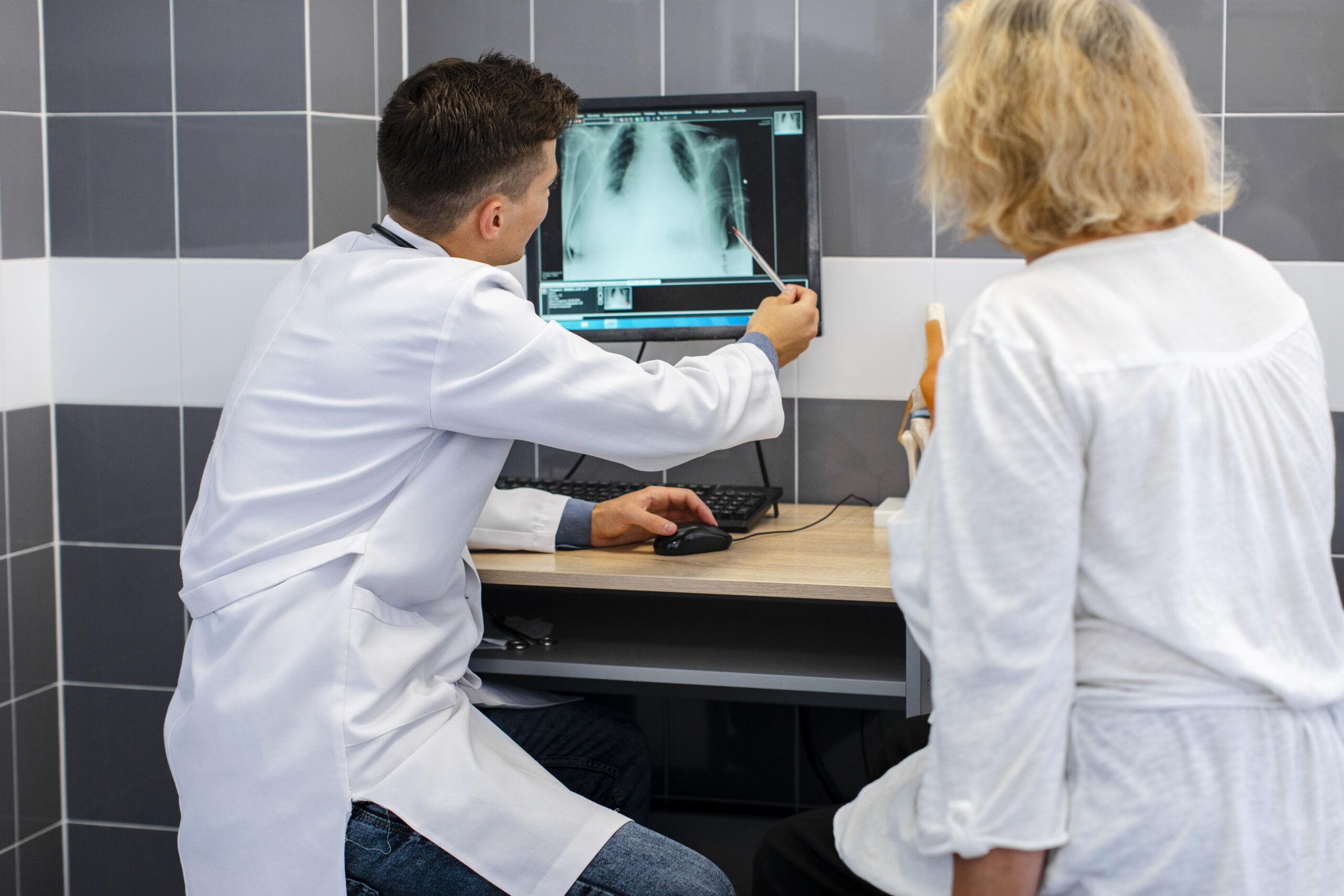Scanner du poumon : dépistage fiable pour le cancer

RDV scanner en ligne sur Doctolib
Prenez rendez-vous pour un scanner dans nos centres
Prise de rendez-vous SCANNER – Paris 75002
Prise de rendez-vous SCANNER – Paris 75009
Prise de rendez-vous SCANNER – Paris 75015

A lung cancer is one of the leading causes of cancer deaths worldwide. The disease is often diagnosed at an advanced stage, reducing the chances of recovery. However, thanks to lung cancer screening, notamment par scanner à faible dose, il est possible de détecter la maladie à un stade précoce et d’améliorer significativement le pronostic des patients. Ce guide explore les différents moyens de détecter, de diagnostiquer et de traiter le cancer du poumon, en mettant l’accent sur l’importance du dépistage précoce pour augmenter les chances de guérir le cancer.
What is lung cancer?
Lung cancer generally develops in the cells of the bronchi or pulmonary alveoli. It is classified into two main types non-small-cell lung cancer (NSCLC) and the small-cell cancer (SCC). Le lung carcinomaThe development of cancer, particularly squamous cell carcinoma and adenocarcinoma, is frequently observed in smokers and ex-smokers. If the disease spreads, it can reach neighbouring lymph nodes and other organs through tumour metastases. In these advanced cases of cancer, the prognosis deteriorates, hence the importance of early detection. Diagnosis of lung cancer is based on clinical and radiological examinations, including CT imaging, which can visualize suspicious tumour masses or lung nodules. Patient prognosis depends largely on the stage of the disease at the time of diagnosis. The earlier the cancer is detected, the better the chances of cure.
What are the symptoms of lung cancer?
These lung cancer symptoms may appear gradually, sometimes at an advanced stage. Common symptoms include :
- Toux persistante ou qui s’aggrave.
- Douleur thoracique, pouvant irradier vers d’autres zones.
- Shortness of breath or feeling of being short of air
- Expectoration of blood
- Unexplained fatigue
- Perte de poids significative.
When a patient shows these signs, it's crucial to see a doctor quickly to avoid damage to lymph nodes or other organs. Early diagnosis of cancer means that the disease can be treated before it spreads uncontrollably, increasing the chances of recovery.
Dépistage du cancer du poumon : comment détecter de façon efficace pour guérir le cancer ?
A lung cancer screening aims to identify the disease before symptoms appear, thereby increasing the chances of effective treatment and cure. In France, the low-dose CT scan is a recognized screening tool, enabling the detection of abnormalities in the lungs, such as pulmonary nodules, with great precision while minimizing radiation exposure. This type of imaging is recommended mainly for high-risk individuals, such as current or former smokers aged between 50 and 74.
How can I be screened for lung cancer?
A chest ct-scan, is the most effective screening method for identifying lung tumours at an early stage. The test is particularly suitable for detecting small tumour lesions, which, if treated early, can be curable. In addition, the test can be used to monitor the evolution of nodules and differentiate between benign and malignant abnormalities, thereby reducing the risk of overdiagnosis. In oncology, this type of screening is essential for accurate and rapid diagnosis. Studies such as the National Lung Screening Trial (NLST) and the European NELSON program have shown that this type of screening reduces lung cancer mortality by 20-24 % in high-risk populations. These results reinforce the importance of lung cancer screening in improving patients' prognosis, particularly in preventing recurrence. Although this test is minimally invasive, it is important to consider the possible side effects associated with radiation exposure. Furthermore, although this screening is targeted at lung cancer, similar methods are also used for other cancers, such as breast cancer, to detect abnormalities at an early stage.
How is lung cancer treated?
A treatment for lung cancer varies according to the type of cancer, the stage of the disease and the patient's general condition. The main treatment options include:
- Surgery: If cancer is detected early, surgery to remove the lung tumour may be considered. This approach is most effective when the disease is localized, and may allow complete resection of the tumor.
- Chemotherapy : Used to treat more advanced forms of cancer, chemotherapy involves administering powerful drugs to destroy cancer cells or slow their growth.
- Radiotherapy : Radiotherapy can be used alone or in conjunction with other treatments to shrink tumors or destroy cancer cells.
- Immunotherapy : This treatment is designed to boost the body's natural defenses against tumor cells, particularly in more aggressive forms of cancer.
- Targeted therapies : Targeted therapies attack specific abnormalities in tumor cells, particularly in lung carcinomas, to block their growth.
When cancer is advanced and has already affected lymph nodes or other organs, treatment focuses on managing symptoms and improving quality of life.
Un diagnostic précis grâce à l’analyse histologique et à la biopsie
Dans le traitement du cancer du poumon, la biopsie joue un rôle central. Elle permet de confirmer la nature cancéreuse d’un nodule ou d’une lésion repérée au scanner, en analysant les cellules à l’échelle histologique. Cette étape est cruciale pour distinguer les différents types de cancers, comme le cancer bronchique non à petites cellules ou les formes métastatiques, et adapter le traitement du cancer. En fonction des mutations génétiques ou des récepteurs tumoraux détectés, les équipes d’oncologie peuvent proposer une thérapie ciblée ou une immunothérapie. Le chirurgien intervient dans les cas où une ablation chirurgicale est possible, notamment lorsque les ganglions ne sont pas atteints. Cette approche intégrée améliore les taux de survie, limite le risque de récidive, et renforce les chances de guérison, notamment dans les nouveaux cas détectés précocement.
Pourquoi choisir IMPC pour le dépistage de votre cancer
En choisissant IMPC, vous bénéficiez :
-
un réseau de 10 centres d’imagerie médicale à Paris
- spécialiste en cancérologie
- Des équipes pluridisciplinaires (oncologues, pneumologues, radiologues…) compétentes dans la prise en charge personnalisée.
- Des équipements de pointe adaptés à chaque traitement : chirurgie, radiothérapie de haute précision, accès à l’immunothérapie et thérapies ciblées.
- Une coordination médicale fluide, de la chirurgie aux soins complémentaires, avec accompagnement psychologique et accès aux essais cliniques.
- Une prise en charge rapide, avec rendez-vous en ligne ou par téléphone, et un suivi de haute qualité.
FAQ : Questions fréquentes sur les traitements du cancer du poumon
Quels sont les traitements possibles du cancer du poumon ?
Selon le type (petites ou non-petites cellules) et le stade, le traitement peut associer chirurgie, radiothérapie, chimiothérapie, immunothérapie ou thérapies ciblées.
La chirurgie est-elle toujours possible ?
En quoi consiste la radiothérapie et dans quels cas est-elle utilisée ?
Nos spécialistes :
-
Charles Yana
Sources scientifiques
-
HAS — Hautes Autorités de Santé, imagerie et sécurité des traitements du cancer.
-
Société Française de Radiologie (SFR) — Recommandations en imagerie thoracique et oncologie.
-
Gustave Roussy — Traitements du cancer du poumon (chirurgie, radiothérapie stéréotaxique, chimiothérapie, immunothérapie, ablation)
-
Cancer.ca — Options de traitement selon les stades du cancer non à petites cellules (chirurgie, radio, chimio, immunothérapie, traitements ciblés)
-
Inserm / Fondation ARC — Données épidémiologiques, enjeux des thérapies ciblées et immunothérapie
Dernière mise à jour : le 30 août 2025
Dr Charles Yana
